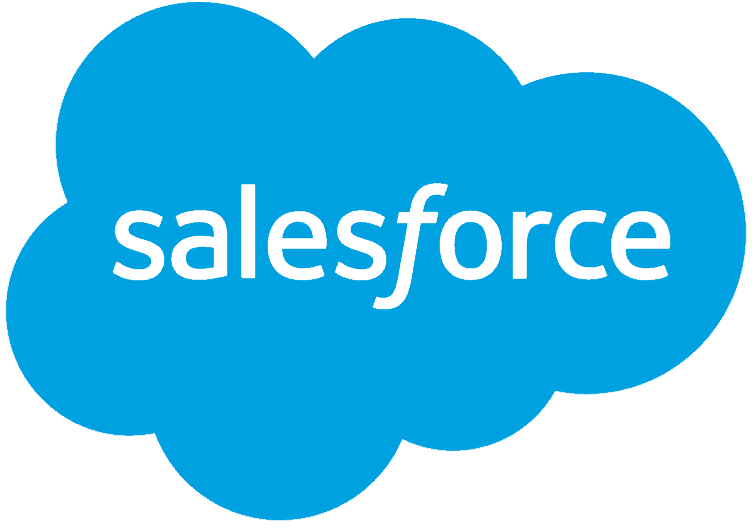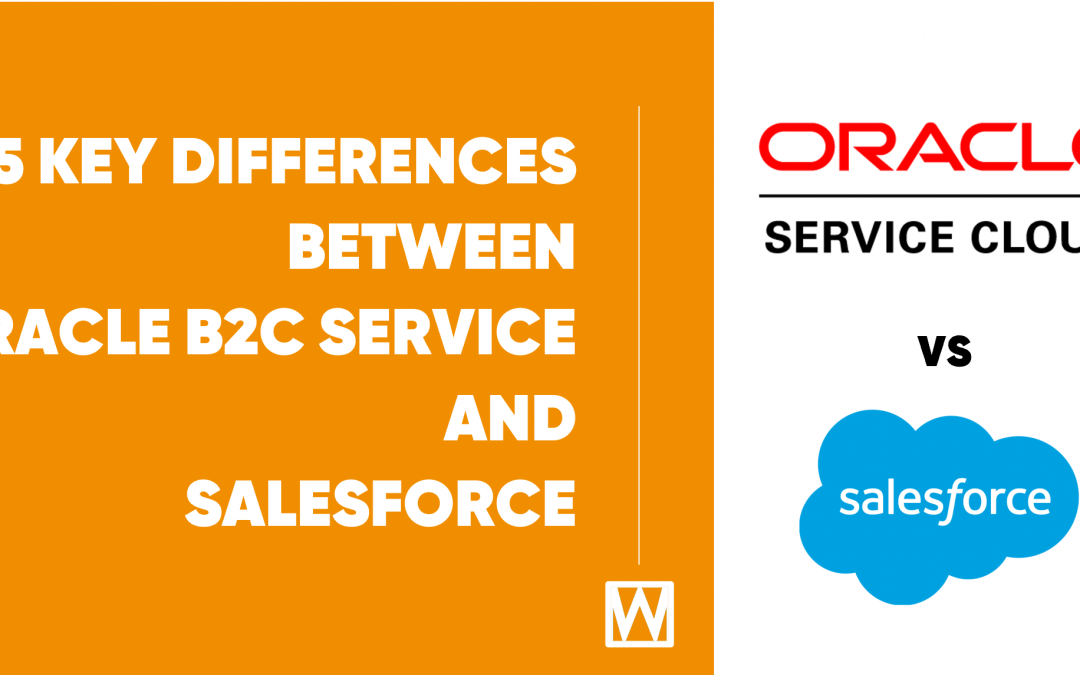In need of or planning to implement a CRM application, and hesitating to either go for Oracle B2C Service or Salesforce?
In this blog we will review both and list the 5 key differences between these two leading CRM giants. But first, let’s start off with some more background information about both systems.

WHAT IS ORACLE B2C SERVICE?
As a part of the Oracle CX Cloud Suite, Oracle B2C Service (aka Oracle Service Cloud or RightNow) is a cloud-based, omnichannel solution that captures a 360-degree view of every customer in a dynamic and unified agent desktop. Oracle B2C Service’s innovative approach is driven by knowledge, automation, and evolving customer interaction channels, simplifying every service experience for service administrators and customers alike. By helping to differentiate your organization’s service experience, Oracle Service Cloud delivers measurable business impacts across all industries.
This flexible and scalable platform includes:
- A highly interactive and pixel-perfect Web and Mobile Customer Service, encouraging customers to self-serve via a customer portal, knowledge base, Facebook page, or peer-based community. Service can also be predictive, through the Internet of Things, or automated through virtual assistants, for example.
- A unified Cross-Channel Contact Center that captures a unique 360-degree view of every consumer across all channels guiding agents to seamless resolution.
- A time-based, self-learning, and predictive Field Service Management (formerly TOA Technologies) that automates and optimizes operations in the field.
- A fully integrated cloud Knowledge Management solution that delivers a seamless and consistent experience across all channels. It is the backbone of every omnichannel service strategy.
- Oracle Policy Automation delivers Smarter Advice–a more personal, richer interaction with customers based on the easy automation of business processes, rules, regulations, and organizational policies.
For more information, click here: https://cloud.oracle.com/en_US/service-cloud
Some examples of organizations that use Oracle B2C Service
Here are some examples of organizations that use Oracle B2C Service: Pacifico Seguros Generales, Elsevier B.V., Madison Area Technical College, Bigtree Entertainment, Pvt. Ltd., HM Land Registry, Walmart Stores Inc., MakeMyTrip Ltd., Orbitz Worldwide LLC, Big Fish Games Inc
User-experiences
As for the user-experiences, Oracle B2C Service is the #5 ranked solution in top CRM Customer Engagement Centers, #7 ranked solution in top Marketing Management tools, and #11 ranked solution in top CRM tools. PeerSpot users give Oracle Service Cloud an average rating of 8.8 out of 10. Oracle B2C Service is popular among the midsize enterprise segment, accounting for 67% of users researching this solution on PeerSpot.

WHAT IS SALESFORCE?
Salesforce is a cloud-based customer relationship management (CRM) platform that helps organizations manage their sales, marketing, customer service, and other business operations. It provides a suite of applications and tools designed to improve customer engagement, streamline business processes, and drive growth.
Salesforce is known for its scalability, flexibility, and ease of use. It operates on a subscription-based model, where businesses pay a monthly or annual fee per user, depending on the features and functionality they require. Furthermore, Salesforce has a vast ecosystem of third-party apps and integrations, allowing businesses to extend the platform’s capabilities and integrate it with other systems they use. Overall, Salesforce has become a leading CRM solution, helping organizations of all sizes enhance customer relationships, streamline operations, and drive business growth
The Salesforce platform offers a wide range of features and functionalities that enable businesses to manage and automate various aspects of their operations. These include:
Sales Cloud
This module helps sales teams track leads, manage opportunities, and automate sales processes.
Service Cloud
It enables businesses to provide excellent customer service by managing and resolving customer inquiries and cases efficiently.
Marketing Cloud
This module assists with marketing campaigns, email marketing, social media management, and analytics to help businesses reach their target audience effectively.
Commerce Cloud
It provides tools for creating personalized and engaging e-commerce experiences across multiple channels.
Community Cloud
It enables organizations to build online communities where customers, partners, and employees can collaborate and engage with each other.
Analytics Cloud
It offers advanced analytics and reporting capabilities to gain insights from data and make data-driven decisions.
App Cloud
This development platform allows businesses to build and deploy custom applications on top of the Salesforce platform.
Some examples of organizations that use Salesforce?
Salesforce is a customer relationship management (CRM) platform that is utilized by thousands of organizations globally, including small businesses, nonprofits, government agencies, and enterprises. Its flexible nature and extensive features make it a popular choice for managing customer data, sales processes, marketing campaigns, and service operations.employed by various organizations across different industries. Here are some examples of organizations that use Salesforce: Google, Amazon, Coca-Cola, General Electric, American Express, Toyota, T-Mobile, Adidas, Marriott International, Dell, Philips, Honda, Verizon, Farmers Insurance and The Hershey Company.
User-experiences
Salesforce is widely regarded as one of the leading customer relationship management (CRM) platforms in the market. It has consistently received positive ratings and has a strong market presence. It has been recognized by various industry analysts and publications for its capabilities, innovation, and market position. For example, Gartner, a leading research and advisory firm, consistently places Salesforce as a leader in its Magic Quadrant for CRM Customer Engagement Center and Magic Quadrant for Sales Force Automation.
Additionally, Salesforce has a large and diverse customer base, including small businesses, mid-sized enterprises, and Fortune 500 companies. Its wide adoption and customer satisfaction are reflected in positive reviews and testimonials from users.
5 KEY DIFFERENCES BETWEEN ORACLE B2C SERVICE AND SALESFORCE

Oracle B2C Service and Salesforce are both popular customer relationship management (CRM) platforms, but they have some key differences. Here are some of the main distinctions between the two:
Focus and Target Market
-
- Oracle B2C Service primarily focuses on customer service and support solutions. It is designed to help businesses manage their customer interactions across multiple channels and provide efficient customer service.
- Salesforce: Salesforce is a comprehensive CRM platform that offers solutions for sales, marketing, customer service, and more. It caters to a broad range of industries and has a wider focus beyond customer service.
Architecture and Deployment
-
- Oracle B2C Service is typically offered as a cloud-based solution. It is a Software-as-a-Service (SaaS) offering, meaning that the software is hosted and managed by Oracle, and customers access it over the internet.
- Salesforce also provides a cloud-based CRM platform. It follows the same SaaS model as Oracle B2C Service, where the software is hosted in the cloud and accessed via the internet.
Features and Functionality
-
- Oracle B2C Service offers features such as case management, knowledge management, customer self-service, web and social customer service, analytics, and reporting. It focuses on providing comprehensive customer support capabilities.
- Salesforce offers a broader range of features beyond customer service. It includes modules for sales force automation, marketing automation, customer service, analytics, community management, and more. Salesforce aims to provide end-to-end customer relationship management solutions.
Integration and Ecosystem
-
- Oracle B2C Service integrates well with other Oracle products and technologies. It can also integrate with third-party applications through its APIs, allowing businesses to connect it with various systems.
- Salesforce has a robust ecosystem and extensive integration capabilities. It offers various APIs and connectors, allowing businesses to integrate it with a wide range of applications, both from Salesforce and third-party providers.
Customization and Flexibility
-
- Oracle B2C Service provides a high level of configurability and customization options. It allows businesses to tailor the system to their specific requirements and workflows.
- Salesforce is known for its flexibility and extensive customization capabilities. It provides a highly customizable platform through its declarative development model, where users can build applications and workflows without writing code.
Please note that both Oracle B2C Service and Salesforce are continually evolving, and new features and capabilities may be added over time. When considering a CRM solution, it’s important to evaluate your organization’s specific needs and requirements to determine which platform aligns best with your goals.
THE ADDED VALUE OF A CRM SYSTEM
There are several benefits to using an online CRM (Customer Relationship Management) system for businesses such as Oracle B2C Service or Salesforce. Here are some key reasons why businesses choose to implement an online CRM system:
Centralized customer data
An online CRM system allows you to store all your customer information in one centralized database. This includes contact details, communication history, purchase history, preferences, and more. Having a single source of truth for customer data makes it easier to access and manage information, providing a complete view of each customer.
Improved customer relationships
With a CRM system, you can track and manage interactions with your customers more effectively. It enables you to record and analyze customer interactions across various channels like emails, phone calls, social media, and in-person meetings. This helps businesses better understand their customers’ needs, preferences, and behaviors, leading to improved customer relationships and personalized interactions.
Enhanced team collaboration
Online CRM systems facilitate collaboration among team members by providing a centralized platform for sharing customer data, notes, and tasks. Team members can access and update customer information in real-time, ensuring everyone has the latest data. This collaborative approach helps teams work together more efficiently, coordinate efforts, and provide a consistent customer experience.
Streamlined sales process
An online CRM system typically includes sales pipeline management features. It enables businesses to track and manage leads, opportunities, and deals throughout the sales process. By having a clear overview of the sales pipeline, sales teams can prioritize leads, follow up effectively, and identify potential bottlenecks. This streamlines the sales process, increases efficiency, and improves conversion rates.
Automation and efficiency
Many online CRM systems offer automation capabilities, such as email marketing, task reminders, and workflow automation. These features save time and effort by automating repetitive tasks, allowing employees to focus on high-value activities. Automation also helps ensure that critical follow-ups and deadlines are not missed, leading to improved productivity and efficiency.
Data-driven insights
Online CRM systems provide reporting and analytics tools that generate valuable insights from customer data. By analyzing data on customer behavior, sales performance, and customer satisfaction, businesses can make data-driven decisions, identify trends, and uncover opportunities for growth. These insights help businesses refine their strategies, optimize their sales and marketing efforts, and drive overall business growth.
Scalability and accessibility
Online CRM systems are typically cloud-based, which means they can scale with your business needs. As your business grows, you can easily add more users, store more data, and expand your CRM capabilities. Moreover, being cloud-based, these systems are accessible from anywhere with an internet connection, allowing remote teams or employees on the go to access and update customer information.
Overall, an online CRM system provides numerous advantages for businesses, including improved customer relationships, streamlined processes, enhanced team collaboration, and data-driven decision-making. It helps businesses effectively manage their customer interactions, drive growth, and stay competitive in today’s highly connected and customer-centric business environment.
MORE INFORMATION
For those in need of an online CRM system and who can use a little help on determining which of these two systems fits their needs best, WeSquare is the perfect partner to turn to. After 15 years managing the most complex and challenging CRM systems around the globe they can advise and even help you to build just the perfect CRM system for your organization: An integrated end-to-end solution that is tailored to your specific business needs and designed to deliver the best possible service experience (CX) for all your customers. Click here for more information, or call us on: +31 853 012 993.

